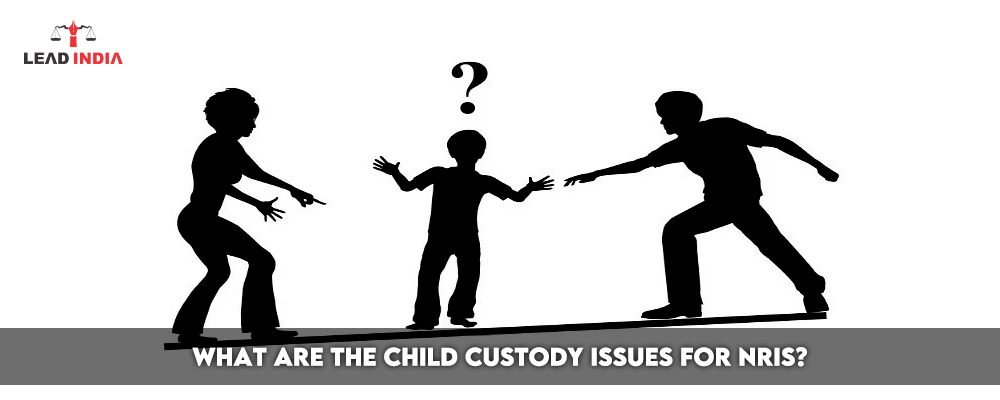When a child is born outside of India or to parents who are Non-Resident Indians (NRI), custody disputes become extremely difficult to resolve. When issues occur, the couples file for divorce and then seek child custody through the family court in their area.
When one parent is awarded custody of the child, the other parent typically takes the child back to their home country and files a petition for custody in that parent’s name. Additionally, the other parent requests that the kid be returned to their marital residence in accordance with the ruling made by the foreign court.
Need A Legal Advice
The internet is not a lawyer and neither are you. Talk to a real lawyer about your legal issue

Child Custody Laws for NRIs
- The Guardian and Wards Act, of 1890, & the Hindu Minority and Guardianship Act, of 1956, are the main laws that Indian courts use to decide child custody disputes. The law in India mostly grants you the ability to request custody or any type of visitation of your child if you are an NRI parent. But you must also remember that the welfare of the child is the top most priority, and the courts take into consideration certain things like the age of the child, the child’s emotional needs, as well as their general health.
- Depending highly on what is best for the welfare of the child, the court of law may award any type of visiting rights, joint custody, or any exclusive custody. Whenever the court of law is determining jurisdiction, it considers both the child’s habitual residence, where the child has been living, and as well as any other current foreign custody orders. Most of the Indian courts will constantly re-evaluate the case to ensure the welfare of the child which is the topmost priority, even though they may respect the decisions that are make in other countries concerning custody.
Child Custody Issues for NRIs
- Disputes Concerning Jurisdiction: Determining which nation’s courts have jurisdiction over NRI custody cases is one of the most important challenges. When parents are abroad, this becomes quite difficult. Judges typically make their decisions based on the child’s place of residence and “habitual residence,” although this might result in protracted disputes over jurisdiction.
- Hague Convention Concerning Child Abduction: The problem of international child abduction occurs when one parent takes the child abroad against the will of the other. Most of the nations that have ratified the Hague Convention may or can ask for the return of the child promptly. But as India is not a signatory to the Hague Convention, it usually makes things more difficult for most of the NRIs.
- Differences in Cultural Norms: Whenever you are determining custodial arrangements, different and various cultural standards on parenting, schooling, and the welfare of the child may or can cause certain problems. Although the child’s best interests are usually take into consideration by the court of law, the interpretation of a judge of those interests may highly vary depending on certain cultural considerations.
- Issues with Immigration: An NRI’s visa status might restrict their ability to enter a country, remain there, or take their child outside India. Before pursuing the case of child custody, it is imperative to address immigration and any kind of visa concerns because they may have a direct impact on the capacity of the parent to care for their child.
- Nationality & Citizenship of the Child: The nationality or citizenship of the child may come up for an open-ended discussion, particularly if one parent wishes to register the child outside India. Most of the legal disputes over rights as well as any type of entitlements may arise whenever the custodial decision considers which nationality or citizenship status mostly best serves the interest of the child.
- Child’s Best Interest as Priority: The issue is that different national courts use different criteria when deciding what is in the child’s “best interests.” Certain nations place greater emphasis on a child’s cultural background, whilst others favor economic stability or educational accessibility. A strong case should be make by parents based on the child’s general well-being, bearing in mind that various courts may give differing weight to different issues.
The child must endure a great deal of hardship at a young age during the custody dispute. No two child custody cases are the same, and even instances that are identical may result in different rulings due to the difficulties involved in weighing the child’s wellbeing, particularly in cases involving cross-border disputes over custody. After a divorce, even though the parents no longer live together, it is still their responsibility to see to it that the child’s needs are met.
The care and supervision of both parents is crucial for a child throughout this critical and impressionable phase of development, as acknowledged by Indian courts. As a result, the court has the responsibility to determine where the child will develop the most, whose custody the child should be left with, and whether the other parent should be allow visitation privileges.
One can talk to lawyers from Lead India for any kind of legal support. In India, free legal advice online can be obtain at Lead India. Along with receiving free legal advice online, one can also ask questions to the experts online free through Lead India.





 Talk to a Lawyer
Talk to a Lawyer